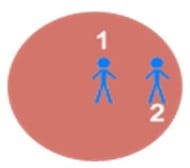Exam Details
Exam Code
:OATExam Name
:Optometry AdmissionCertification
:Test Prep CertificationsVendor
:Test PrepTotal Questions
:274 Q&AsLast Updated
:Aug 10, 2025
Test Prep Test Prep Certifications OAT Questions & Answers
-
Question 251:
The half-life of an unknown element is 4 days. In an original sample of 50 g, how much of it will have decayed after 12 days?
A. 50 g
B. 43.75 g
C. 25 g
D. 12.5 g
E. 6.25 g
-
Question 252:
Three different objects have the same velocity, and the same mass of 20 kg. Which of the following attributes will these objects have the same value for?
A. Momentum
B. Density
C. Acceleration
D. Diameter
E. Cannot be determined
-
Question 253:
A charged particle is traveling to the right with its magnetic field coming into the page (or screen). Which direction does its force face?
A. Out of the page
B. Into the page
C. Left
D. Right
E. Up
-
Question 254:
Rank the following in the correct order of increasing wavelength:
A. X-rays, Gamma rays, Visible light, Radio waves, UV
B. Gamma rays, X-rays, Infrared, UV, Radio waves
C. Radio waves, Infrared, UV, X-rays, Gamma rays
D. X-rays, Gamma rays, UV, Infrared, Radio waves
E. Gamma rays, X-rays, UV, Infrared, Radio waves
-
Question 255:
Two guys are sitting on a playground Merry-Go-Round. Which of the following statements is correct?

A. Guy 1 will make a full circle before Guy 2.
B. Guy 1 will travel at a higher velocity.
C. Guy 1 and Guy 2 will travel at equal velocity.
D. Guy 2 will travel at higher velocity.
E. Guy 2 will make a full circle before Guy 1.
-
Question 256:
A car's velocity history is displayed in the graph below. What is the displacement of the car from 0 s to 10 s?

A. 0
B. 16
C. 28.5
D. 33.5
E. 42
-
Question 257:
It is most likely that you have never had diphtheria. You probably don't even know anyone who has suffered from this disease. In fact, you may not even know what diphtheria is. Similarly, diseases like whooping cough, measles, mumps, and rubella may all be unfamiliar to you. In the nineteenth and early twentieth centuries, these illnesses struck hundreds of thousands of people in the United States each year, mostly children, and tens of thousands of people died. The names of these diseases were frightening household words. Today, they are all but forgotten. That change happened largely because of vaccines.
You probably have been vaccinated against diphtheria. You may even have been exposed to the bacterium that causes it, but the vaccine prepared your body to fight off the disease so quickly that you were unaware of the infection. Vaccines take advantage of your body's natural ability to learn how to combat many disease-causing germs, or microbes. What's more, your body remembers how to protect itself from the microbes it has encountered before. Collectively, the parts of your body that remember and repel microbes are called the immune system. Without the proper functioning of the immune system, the simplest illness ?even the common cold ?could quickly turn deadly.
On average, your immune system needs more than a week to learn how to fight off an unfamiliar microbe. Sometimes, that isn't enough time. Strong microbes can spread through your body faster than the immune system can fend them off. Your body often gains the upper hand after a few weeks, but in the meantime you are sick. Certain microbes are so virulent that they can overwhelm or escape your natural defenses. In those situations, vaccines can make all the difference.
Traditional vaccines contain either parts of microbes or whole microbes that have been altered so that they don't cause disease. When your immune system confronts these harmless versions of the germs, it quickly clears them from your body. In other words, vaccines trick your immune system in order to teach your body important lessons about how to defeat its opponents.
What is the meaning of the word virulent as it is used in the third paragraph?
A. tiny
B. malicious
C. contagious
D. annoying
-
Question 258:
It is most likely that you have never had diphtheria. You probably don't even know anyone who has suffered from this disease. In fact, you may not even know what diphtheria is. Similarly, diseases like whooping cough, measles, mumps, and rubella may all be unfamiliar to you. In the nineteenth and early twentieth centuries, these illnesses struck hundreds of thousands of people in the United States each year, mostly children, and tens of thousands of people died. The names of these diseases were frightening household words. Today, they are all but forgotten. That change happened largely because of vaccines.
You probably have been vaccinated against diphtheria. You may even have been exposed to the bacterium that causes it, but the vaccine prepared your body to fight off the disease so quickly that you were unaware of the infection. Vaccines take advantage of your body's natural ability to learn how to combat many disease-causing germs, or microbes. What's more, your body remembers how to protect itself from the microbes it has encountered before. Collectively, the parts of your body that remember and repel microbes are called the immune system. Without the proper functioning of the immune system, the simplest illness ?even the common cold ?could quickly turn deadly.
On average, your immune system needs more than a week to learn how to fight off an unfamiliar microbe. Sometimes, that isn't enough time. Strong microbes can spread through your body faster than the immune system can fend them off. Your body often gains the upper hand after a few weeks, but in the meantime you are sick. Certain microbes are so virulent that they can overwhelm or escape your natural defenses. In those situations, vaccines can make all the difference.
Traditional vaccines contain either parts of microbes or whole microbes that have been altered so that they don't cause disease. When your immune system confronts these harmless versions of the germs, it quickly clears them from your body. In other words, vaccines trick your immune system in order to teach your body important lessons about how to defeat its opponents.
Which statement is not a detail from the passage?
A. Vaccines contain microbe parts or altered microbes.
B. The immune system typically needs a week to learn how to fight a new disease.
C. The symptoms of disease do not emerge until the body has learned how to fight the microbe.
D. A hundred years ago, children were at the greatest risk of dying from now-treatable diseases.
-
Question 259:
It is most likely that you have never had diphtheria. You probably don't even know anyone who has suffered from this disease. In fact, you may not even know what diphtheria is. Similarly, diseases like whooping cough, measles, mumps, and rubella may all be unfamiliar to you. In the nineteenth and early twentieth centuries, these illnesses struck hundreds of thousands of people in the United States each year, mostly children, and tens of thousands of people died. The names of these diseases were frightening household words. Today, they are all but forgotten. That change happened largely because of vaccines.
You probably have been vaccinated against diphtheria. You may even have been exposed to the bacterium that causes it, but the vaccine prepared your body to fight off the disease so quickly that you were unaware of the infection. Vaccines take advantage of your body's natural ability to learn how to combat many disease-causing germs, or microbes. What's more, your body remembers how to protect itself from the microbes it has encountered before. Collectively, the parts of your body that remember and repel microbes are called the immune system. Without the proper functioning of the immune system, the simplest illness ?even the common cold ?could quickly turn deadly.
On average, your immune system needs more than a week to learn how to fight off an unfamiliar microbe. Sometimes, that isn't enough time. Strong microbes can spread through your body faster than the immune system can fend them off. Your body often gains the upper hand after a few weeks, but in the meantime you are sick. Certain microbes are so virulent that they can overwhelm or escape your natural defenses. In those situations, vaccines can make all the difference.
Traditional vaccines contain either parts of microbes or whole microbes that have been altered so that they don't cause disease. When your immune system confronts these harmless versions of the germs, it quickly clears them from your body. In other words, vaccines trick your immune system in order to teach your body important lessons about how to defeat its opponents.
What is the main idea of the passage?
A. The nineteenth and early twentieth centuries were a dark period for medicine.
B. You have probably never had diphtheria.
C. Traditional vaccines contain altered microbes.
D. Vaccines help the immune system function properly.
-
Question 260:
PLASTICS
Plastics have long been considered one of the great conveniences of the modern era, but evidence is mounting to indicate that these conveniences have come at an incredible cost. The chief benefit of plastics is their durability, but this benefit turns out to be the same reason plastic has become a significant problem: It takes 200 to 400 years to decompose. All of this plastic has accumulated into a catastrophic mess and has also caused disease in humans.
Between Hawaii and Japan, a giant mass of plastic twice the size of Texas slowly swirls with the currents of the Pacific Ocean. This area has come to be known as the Great Pacific Garbage Patch, and its effects on the ecology of the ocean are unimaginable. According to United Nations researchers, a hundred thousand sea mammals and a million seabirds die each year. They are found with cigarette lighters, syringes, and other plastics that they mistake for food in their stomachs.
Evidence also indicates that the plastic receptacles that people store their food in poses health risks. For instance, phthalates have been shown to have detrimental effects on the reproductive system, yet they are found in many plastic products including baby bottles and water bottles. They have also been linked to various forms of cancer. Additionally, a chemical called bisphenol A that is found in many plastics can mimic the effects of the hormone estrogen, which can also affect the reproductive system.
What particular risk does the author say the Great Pacific Garbage Patch poses to marine animals?
A. The animals' habitat is poisoned by phthalates.
B. It affects yearly temperature averages.
C. Animals accidentally ingest the plastics and die.
D. Seabirds cannot get to the fish below the garbage.
Related Exams:
AACD
American Academy of Cosmetic DentistryACLS
Advanced Cardiac Life SupportASSET
ASSET Short Placement Tests Developed by ACTASSET-TEST
ASSET Short Placement Tests Developed by ACTBUSINESS-ENVIRONMENT-AND-CONCEPTS
Certified Public Accountant (Business Environment amd Concepts)CBEST-SECTION-1
California Basic Educational Skills Test - MathCBEST-SECTION-2
California Basic Educational Skills Test - ReadingCCE-CCC
Certified Cost Consultant / Cost Engineer (AACE International)CGFNS
Commission on Graduates of Foreign Nursing SchoolsCLEP-BUSINESS
CLEP Business: Financial Accounting, Business Law, Information Systems & Computer Applications, Management, Marketing
Tips on How to Prepare for the Exams
Nowadays, the certification exams become more and more important and required by more and more enterprises when applying for a job. But how to prepare for the exam effectively? How to prepare for the exam in a short time with less efforts? How to get a ideal result and how to find the most reliable resources? Here on Vcedump.com, you will find all the answers. Vcedump.com provide not only Test Prep exam questions, answers and explanations but also complete assistance on your exam preparation and certification application. If you are confused on your OAT exam preparations and Test Prep certification application, do not hesitate to visit our Vcedump.com to find your solutions here.
